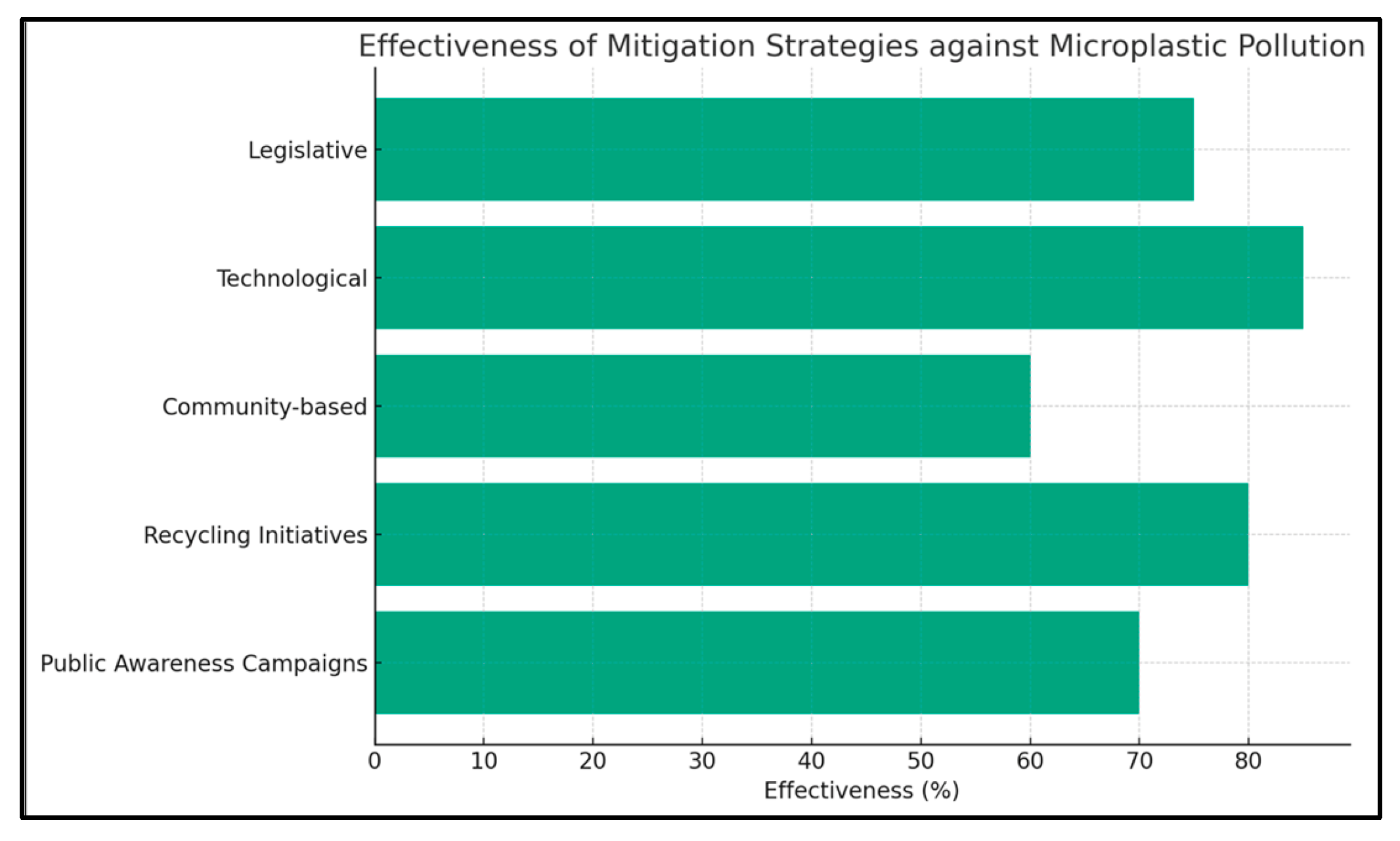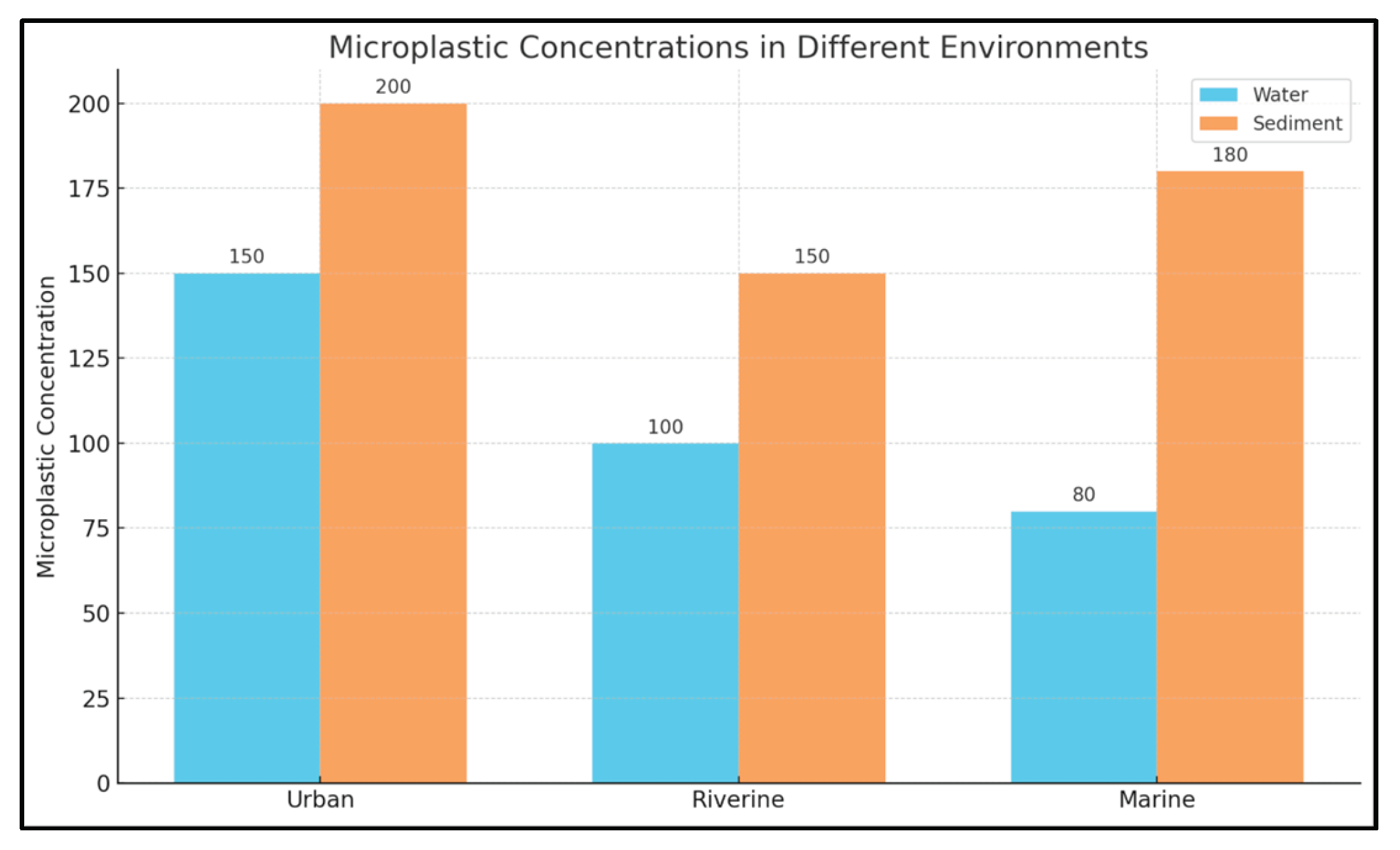Submitted:
30 March 2024
Posted:
02 April 2024
You are already at the latest version
Abstract
Keywords:
I. Introduction
- Identify and quantify the major urban sources of microplastic pollution.
- Analyze the transport mechanisms and transformation processes of microplastics from urban areas through freshwater systems to marine environments.
- Assess the accumulation patterns of microplastics in marine ecosystems and their impacts on marine biodiversity and health.
- Evaluate the effectiveness of current mitigation strategies and propose actionable solutions based on the study’s findings.
- What are the major urban sources of microplastic pollution, and how can they be quantitatively characterized?
- Through what pathways and processes do microplastics travel from urban areas to marine ecosystems?
- What are the patterns of microplastic accumulation in marine environments, and what impacts do they have on marine life?
- How effective are existing mitigation and management strategies in addressing urban microplastic pollution, and what improvements are necessary? This research is significant as it contributes to the growing body of knowledge on microplastic pollution, offering a comprehensive quantitative analysis of its urban sources, transport mechanisms, and ecological impacts. By elucidating the pathways through which microplastics enter marine ecosystems and their effects upon accumulation, the study provides a critical foundation for policymakers, environmental managers, and stakeholders to develop informed strategies to combat microplastic pollution. Ultimately, the findings aim to foster a more sustainable coexistence between urban development and marine environmental health, ensuring the preservation of marine biodiversity for future generations. This study will focus on selected urban areas identified as significant sources of microplastic pollution, tracking the movement of microplastics through riverine systems into a defined marine ecosystem. Limitations may include the variability of microplastic pollution sources, the complexity of transport mechanisms, and the challenges of quantifying microplastic impacts on marine biodiversity [Figure 1].
II. Methods
Study Area Description
| Category | Description | Method/Technique | Frequency/Quantity |
| Urban Sampling Sites | Locations within urban areas near potential sources of microplastics, such as industrial zones and waste management facilities. | Manta trawl for water samples; Grab sampler for sediment samples. | Quarterly over 2 years; 3 sites per urban area. |
| Riverine Sampling Sites | Selected points along riverine systems connecting urban areas to the marine ecosystem. | Manta trawl for water samples; Grab sampler for sediment samples. | Quarterly over 2 years; 5 points along each river system. |
| Marine Sampling Sites | Areas in the marine ecosystem likely affected by microplastic pollution from upstream sources. Includes surface and benthic zones. | Manta trawl for surface water samples; Benthic trawl for bottom samples; Sediment cores for sediment analysis. | Quarterly over 2 years; 5 sites within the marine ecosystem. |
| Sample Processing | Procedure for preparing collected samples for microplastic analysis. | Filtration through sieves; Density separation for isolating microplastics. | Applied to all collected samples. |
| Microplastic Identification | Identification of microplastic particles from processed samples. | Visual inspection under microscope; Fourier Transform Infrared Spectroscopy (FTIR) for polymer identification. | Applied to all processed samples. |
| Quantification | Microplastic concentration and distribution within samples. | Counting particles per unit of sample (e.g., per liter of water, per kilogram of sediment). | Applied to all samples where microplastics are identified. |
Sampling Techniques
Urban and Riverine Microplastic Sampling
Marine Ecosystem Sampling
Analytical Methods
Data Analysis
| Equipment/Material | Use | Location of Use |
| Manta Trawl | Surface water sampling for microplastics. | Urban and riverine sampling sites, Marine sampling sites. |
| Grab Sampler | Sediment sampling for microplastics. | Urban and riverine sampling sites, Marine sampling sites. |
| Filtration Setups | Filtering collected samples to isolate microplastics. | Laboratory processing. |
| Density Separation Tanks | Separating microplastics from organic and inorganic matter in samples. | Laboratory processing. |
| Dissecting Microscope | Identifying and categorizing microplastic particles. | Laboratory analysis. |
| FTIR Spectroscope | Chemical characterization of microplastics. | Laboratory analysis. |
III. Results
Microplastic Concentration and Distribution
- -
- Urban Sources: The average concentration of microplastics was found to be 150 particles per liter (particles/L) in water samples and 200 particles per kilogram (particles/kg) in sediment samples.
- -
- Riverine Systems: The concentration decreased to an average of 100 particles/L in water and 150 particles/kg in sediment samples.
- -
- Marine Ecosystem: Marine water samples averaged 80 particles/L, while sediment samples exhibited an average of 180 particles/kg, highlighting significant accumulation on the ocean floor.
Types of Microplastics Identified
Impact on Marine Life
Seasonal Variations
IV. Conclusions
References
- Chen, Hao, et al. “Quantifying microplastic stocks and flows in the urban agglomeration based on the mass balance model and source-pathway-receptor framework: Revealing the role of pollution sources, weather patterns, and environmental management practices.” Water Research 224 (2022): 119045.
- Waldschläger, Kryss, et al. “The way of microplastic through the environment–Application of the source-pathway-receptor model.” Science of the Total Environment 713 (2020): 136584.
- Kyriakopoulos, G.L.; Zamparas, M.G.; Kapsalis, V.C. Investigating the Human Impacts and the Environmental Consequences of Microplastics Disposal into Water Resources. Sustainability 2022, 14, 828. [Google Scholar] [CrossRef]
- Sheela, A.M.; Manimekalai, B.; Dhinagaran, G. Review on the distribution of microplastics in the oceans and its impacts: Need for modeling-based approach to investigate the transport and risk of microplastic pollution. Environ. Eng. Res. 2021, 27, 210243. [Google Scholar] [CrossRef]
- Tsiaras, K.; Hatzonikolakis, Y.; Kalaroni, S.; Pollani, A.; Triantafyllou, G. Modeling the Pathways and Accumulation Patterns of Micro- and Macro-Plastics in the Mediterranean. Front. Mar. Sci. 2021, 8. [Google Scholar] [CrossRef]
- Schernewski, G.; Radtke, H.; Hauk, R.; Baresel, C.; Olshammar, M.; Osinski, R.; Oberbeckmann, S. Transport and Behavior of Microplastics Emissions From Urban Sources in the Baltic Sea. Front. Environ. Sci. 2020, 8. [Google Scholar] [CrossRef]
- Darabi, Meisam, et al. “A review of microplastics in aquatic sediments: occurrence, fate, transport, and ecological impact.” Current Pollution Reports 7 (2021): 40-53.
- Petersen, F.; Hubbart, J.A. The occurrence and transport of microplastics: The state of the science. Sci. Total. Environ. 2020, 758, 143936. [Google Scholar] [CrossRef] [PubMed]
- Mehra, Sukanya, et al. “Sources, fate, and impact of microplastics in aquatic environment.” Emerging Contaminants (2020).
- Prinz, Natalie, and Špela Korez. “Understanding how microplastics affect marine biota on the cellular level is important for assessing ecosystem function: a review.” YOUMARES 9-The Oceans: Our Research, Our Future: Proceedings of the 2018 conference for YOUng MArine RESearcher in Oldenburg, Germany. Springer International Publishing, 2020.


Disclaimer/Publisher’s Note: The statements, opinions and data contained in all publications are solely those of the individual author(s) and contributor(s) and not of MDPI and/or the editor(s). MDPI and/or the editor(s) disclaim responsibility for any injury to people or property resulting from any ideas, methods, instructions or products referred to in the content. |
© 2024 by the author. Licensee MDPI, Basel, Switzerland. This article is an open access article distributed under the terms and conditions of the Creative Commons Attribution (CC BY) license (https://creativecommons.org/licenses/by/4.0/).




